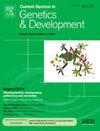解决灵长类动物进化中调控变异缺失的背景
IF 3.6
2区 生物学
Q2 CELL BIOLOGY
引用次数: 0
摘要
在灵长类动物中,与适应性性状变异相关的基因座通常位于非编码区。理解将这些调节变异与健康相关表型联系起来的机制仍然具有挑战性,但可以使用功能基因组数据来解决。然而,这种数据很少在非人类灵长类动物中大规模产生。尽管越来越多的人认识到适应性变异经常表现出环境依赖效应,但当它们存在时,通常只考虑特定的组织、细胞类型、发育阶段和细胞环境。在这篇综述中,我们(1)讨论了为什么环境依赖的调控位点可能与理解灵长类动物的适应性进化特别相关,(2)探讨了绘制这种环境依赖变异的挑战和新兴解决方案,(3)讨论了这些数据可以解决的科学问题。填补这些空白将为进化过程、人类疾病和调节适应提供关键的见解。本文章由计算机程序翻译,如有差异,请以英文原文为准。
Addressing missing context in regulatory variation across primate evolution
In primates, loci associated with adaptive trait variation often fall in noncoding regions. Understanding the mechanisms linking these regulatory variants to fitness-relevant phenotypes remains challenging but can be addressed using functional genomic data. However, such data are rarely generated at scale in nonhuman primates. When they are, only select tissues, cell types, developmental stages, and cellular environments are typically considered, despite growing appreciation that adaptive variants often exhibit context-dependent effects. In this review, we (1) discuss why context-dependent regulatory loci might be especially relevant for understanding adaptive evolution in primates, (2) explore challenges and emerging solutions for mapping such context-dependent variation, and (3) discuss the scientific questions these data could address. Filling these gaps will provide critical insights into evolutionary processes, human disease, and regulatory adaptation.
求助全文
通过发布文献求助,成功后即可免费获取论文全文。
去求助
来源期刊
CiteScore
7.90
自引率
0.00%
发文量
102
审稿时长
1 months
期刊介绍:
Current Opinion in Genetics and Development aims to stimulate scientifically grounded, interdisciplinary, multi-scale debate and exchange of ideas. It contains polished, concise and timely reviews and opinions, with particular emphasis on those articles published in the past two years. In addition to describing recent trends, the authors are encouraged to give their subjective opinion of the topics discussed.
In Current Opinion in Genetics and Development we help the reader by providing in a systematic manner:
1. The views of experts on current advances in their field in a clear and readable form.
2. Evaluations of the most interesting papers, annotated by experts, from the great wealth of original publications.[...]
The subject of Genetics and Development is divided into six themed sections, each of which is reviewed once a year:
• Cancer Genomics
• Genome Architecture and Expression
• Molecular and genetic basis of disease
• Developmental mechanisms, patterning and evolution
• Cell reprogramming, regeneration and repair
• Genetics of Human Origin / Evolutionary genetics (alternate years)

 求助内容:
求助内容: 应助结果提醒方式:
应助结果提醒方式:


